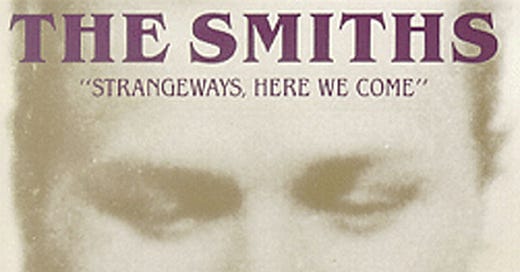Has the Perrier gone straight to my head?
The Smiths - 'I Won't Share You' (Strangeways Here We Come - 1987)
Within 15 seconds of their recorded introduction to the rest of the world, The Smiths guitarist Johnny Marr deploys a wailing harmonica, which I was almost tempted to categorise as a harmonica sting - as if it has been picked up by accident and used to soundtrack a 1980s video nasty. A little over four years and seventy-odd songs later, they are recording the final track on what will be their final album, and there is a harmonica wailing here as well, but it sounds more like it is deflated than anything else.
Finishing a final song on a final album with a harmonica call-back to an earlier song is a nice touch that someone else would use some three decades later.
Seeing more and feeling less
Before my children were born, my wife and I woke to the sound of BBC6 Music on a DAB radio. This alarm call was just before 7 am; we still had work offices to attend physically, back then. A few mornings had entertainment news breaking overnight, and I remember several of them clearly.
For obvious reasons, David Bowie’s Blackstar has death as the spectre at the feast. The Smiths’ swansong, Strangeways, Here We Come, is similarly tied up with endings, denouements and full stops. Arriving two months after the band split, the ten tracks feature ghosts, finishes, deaths, comas, stopping, loneliness, dying again, a dead star, death and finally, a kiss-off from the singer to the guitarist.
While the album was in final preparations to be released, Marr left The Smiths under the misconception that an NME article with the headline "Smiths to Split" had been influenced by Morrissey. The piece, authored by Danny Kelly, suggested a rift between Morrissey and Marr, exacerbated by Morrissey's displeasure over Marr's collaborations with external projects and other artists1 and a breakdown in the chemistry their partnership had forged. Marr clarified to NME that his departure was not due to personal discord but a desire for broader musical exploration. Later, Marr would say he wasn’t in the band to cover songs like ‘Work Is A Four Letter Word’ and ‘Golden Lights’ by 1960s pop acts Twinkle and Cilla Black, respectively.
For Morrissey to pen ‘I Won't Share You’ when he was rumoured to be displeased with sharing his guitarist is surely no coincidence. The song holds a sense of poignant finality with its understated elegance. Marr’s autoharp coaxes out more of Morrissey’s singing voice, pushing him close to crooning like a flamboyant lead of a long-gone era rather than a contemporary of Mark E. Smith or Bernard Sumner. Morrissey as matinee idol was an area The Smiths didn’t often wade into, but here, the mix between that and the emotional heft of an ‘Asleep’ or ‘Please, Please, Please…’ is a worthy swansong for the most important UK indie band of the decade.
The song was recorded during the twilight of the album's recording sessions in 1987 at Wool Hall Studios in Bath, under the guiding hand of producer Stephen Street, adding some continuity despite the band’s move from Rough Trade to EMI after some protracted contractual wrangling that held The Queen is Dead back much deeper into 1986 than initially planned.
The song emerged spontaneously amidst the creative ferment of the recording process and showed Marr's capacity for musical innovation. With an instrument as esoteric as a 1777 autoharp, Marr conjured a sound that was both mesmerising and singular, giving the song a hauntingly beautiful backbone. This moment of serendipity, as Morrissey recounts in 2013’s Autobiography, was a testament to Marr's intuitive grasp of uncharted sonic territories, elevating a simple lullaby into a piece laden with emotional gravitas;
A window-ledge in a forgotten corner of the Wool Hall studios showcases a peculiar stringed instrument from 1777, which Johnny instantly grabs – ’Oh, let’s see how this sounds’ – and, by second run-through, he can play the oddly stringed lyre that has no sound hole. The strings are possibly horsehair, and there is a barely usable tuning bar, but the sound Johnny finds is mesmerising, and the song ‘I Won’t Share You’ is alive. It is a fascinating moment when Johnny’s inner ear leads the way to somewhere unknown – somewhere mistrusted by all until the final depth of thought strikes.
The narrative that the song is centred around Morrisey’s possessiveness and jealousy of Marr is bolstered by the song's minimalist arrangement—Marr's autoharp accompanied only by Morrissey's evocative vocals, a stark departure from The Smiths' characteristic jangle pop sound. This sparseness serves not as a diminishment but as a distillation of their artistry, focusing your attention on the raw emotional core of the song. There are many points on Strangeways where the band push away from their classic sound into more of an electronic realm where guitars are less prominent, or in the case of the opening track, ‘A Rush and a Push and the Land Is Ours’, completely absent.
When Morrissey recorded the vocals, Stephen Street was moved to tears - considering the song as an olive branch to his writing partner, saying the beauty of the lyrics and the chords Marr was playing on the autoharp gave him chills down his spine. As Simon Goddard says in his song-by-song account of the band Songs That Saved Your Life, those chords (G, Am, C and D) are just a slowed-down, rehash of ‘Ask’ - thankfully the song merely recycles that melody and creates a far more interesting sonic environment with ‘I Want Share You’ than that 1986 single. Goddard speculates that we might be barking up the wrong tree and that the song may be about Linda Sterling. Her band Ludus had a retrospective release cancelled in 1985, but a certain Stephen Patrick Morrissey wrote the liner notes which say,
Oh Linder, Oh Linder. I will see you sometime, somewhere.
Despite the profound resonance that some fans hold for ‘I Won’t Share You’ within The Smiths' oeuvre, it remains elusive, never graced by the live performance stage, its delicate intricacies preserved in the studio recording alone. This absence of reinterpretation in a live setting only amplifies its mystique, cementing its status as a piece untouched by the passage of time, existing in a pristine, almost ethereal state. It wasn’t until 2019 that Morrissey performed the song as a solo artist, and then it was only three times within six months.
As the final note in The Smiths' storied career, it leaves listeners with a lingering sense of bittersweet closure, a gentle yet poignant reminder of the band's lasting impact on the music landscape.
Before Sept 1987, Marr had worked on albums or songs by Everything But The Girl and Billy Bragg, and before the decade was out, he’d go on to work with Bryan Ferry, Talking Heads, Sandie Shaw, Kirsty MacColl, The Pretenders and The The.






You had me at the title of this article. I’ve never opened a post so quickly!